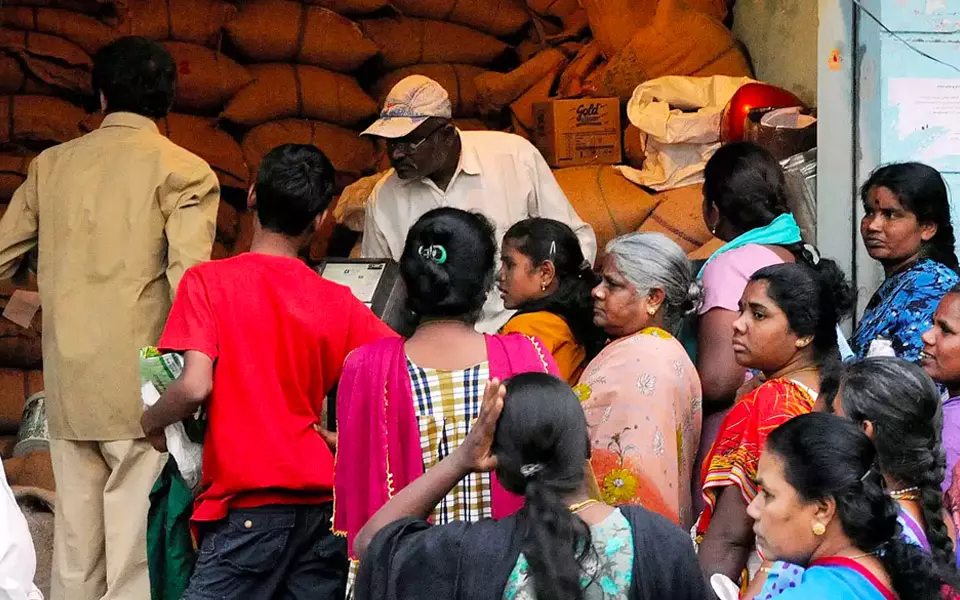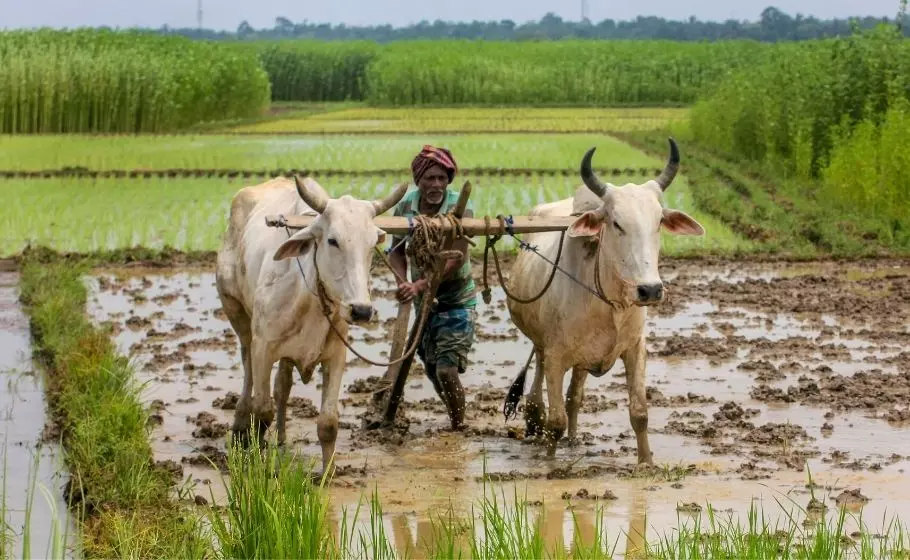
- Home
- India
- World
- Premium
- THE FEDERAL SPECIAL
- Analysis
- States
- Perspective
- Videos
- Sports
- Education
- Entertainment
- Elections
- Features
- Health
- Business
- Series
- In memoriam: Sheikh Mujibur Rahman
- Bishnoi's Men
- NEET TANGLE
- Economy Series
- Earth Day
- Kashmir’s Frozen Turbulence
- India@75
- The legend of Ramjanmabhoomi
- Liberalisation@30
- How to tame a dragon
- Celebrating biodiversity
- Farm Matters
- 50 days of solitude
- Bringing Migrants Home
- Budget 2020
- Jharkhand Votes
- The Federal Investigates
- The Federal Impact
- Vanishing Sand
- Gandhi @ 150
- Andhra Today
- Field report
- Operation Gulmarg
- Pandemic @1 Mn in India
- The Federal Year-End
- The Zero Year
- Science
- Brand studio
- Newsletter
- Elections 2024
- Events
Why ration loss is pushing FPO directors to desperation, likely resignation
Attempts to regularise discrepancies in the public distribution system has landed FPO directors in trouble with their director identification numbers purportedly resulting in them being identified as not eligible for benefits under NFSA

Anita Meena, in her 30s, is a director in a farmer producer organisation (FPO) in Udaipur district’s Kherwada block, but she is considering resigning. Meena enjoys her work, but the alleged demands of the job are making it difficult for her to carry on in the role. For if she was to remain FPO director, her family may well have to resign themselves to not having enough to eat.For the past...
Anita Meena, in her 30s, is a director in a farmer producer organisation (FPO) in Udaipur district’s Kherwada block, but she is considering resigning. Meena enjoys her work, but the alleged demands of the job are making it difficult for her to carry on in the role. For if she was to remain FPO director, her family may well have to resign themselves to not having enough to eat.
For the past two years, Meena has worked hard to create an identity for herself, even as she helped farmers select the right seeds to sow, the best fertiliser to increase their yield and provided them advice on animal husbandry. The knowledge she shared, she had gathered over the years working in the agricultural sector — one of the criteria for becoming an FPO member/director is that the person has to be a farmer. But Meena’s current ‘glamorous’ designation has allegedly resulted in her being refused provisions she would receive under the National Food Security Act (NFSA), 2013.
Kherwada has the unenviable distinction of being one of the most backward regions of India. According to Niti Aayog’s backward block list, it is an 'aspirational block', which means it is part of a central programme aimed at improving governance in the area.
Meena is a company director, but her family of seven lives on the produce of a small piece of agricultural land, the earnings from the milk produced by their three cows and subsidised government ration. Unfortunately, when she went to pick up her quota of the monthly ration in September, she was allegedly told that she could no longer receive the provisions owing to her director identification number (issued to company directors for transparency in governance) and her name being among the authorised bank signatories for the FPO Vrithi Agro Producer Company Limited and its audit report — details which were assumed to be indicative of her being above the livelihood category that is the targeted beneficiary of the NFSA scheme.
“The ration dealer refused to give my share of 35 kg of food grain this month. How will I fill this gap? Being a director of an FPO doesn’t make me rich. We are just able to scrape through,” Meena told The Federal. She added: “I don’t get paid for the work I do at the FPO. Sometimes I get Rs 300 for attending meetings, but that too in two-three months.”
Also read: Punjab floods: How Ravi’s fury, embankment collapse brought calamity to farmers
FPOs are collectives of small and marginal farmers formed under the centre’s “Formation and Promotion of 10,000 Farmer Producer Organizations (FPOs)” scheme in 2020, with a total budgetary outlay of Rs 6,865 crore. The aim was to enable farmers to enhance their bargaining power, reduce cost of production and enhance farmers’ incomes through aggregation of their agricultural produce, thus helping them move towards sustainable incomes. The Ministry of Agriculture and Farmers' Welfare in a release in 2023 claimed that against the target of 10,000 FPOs (till 2027-28), 7,597 FPOs had already been registered in 34 states and Union territories.
According to Vrithi Agro Producer Company, CEO, Surjaram Rar, the FPO set up in 2023 had a turnover of Rs 50 lakh and 640 shareholders. It has a five-member board of directors, which includes Meena.
“Anita has been removed from the list [of NFSA beneficiaries] probably because she signs the audit report. These directors are actually from very poor families and a large part of their survival is dependent on the ration they receive under the NFSA,” he said.
In July, the union food secretary reportedly wrote to state chief secretaries, urging them to reveal discrepancies identified in the ration card management system. Subsequently a list was prepared to match details of NFSA beneficiaries with databases of taxpayers, car owners and company directors. Meena, being a director of a company, purportedly received a notification to verify her eligibility for receiving subsidised ration, after her name appeared on the list.

A crowded subsidised ration distribution shop. Representational image. Photo: iStock
Now, Meena says she feels compelled to resign from her position as an FPO director because her family can’t manage without the subsidised ration. “I would have liked to work but if I remain with the company, I will not remain a [NFSA] beneficiary anymore and will have to forgo benefits from other various government schemes [meant for families living below the poverty line], which I cannot afford to do,” she said.
Hers is not an isolated case. Hurti Bai of Samriddhi Agriculture Produce Company in Sirohi, a member of the Garasiya scheduled tribe community, and at least nine other directors in Rajasthan have received such notifications for verification of their names being removed from the NFSA beneficiaries list, claimed Birbal Ram, chief executive of the Samriddhi Agriculture Produce Company. Additionally, small farmers numbering over 15000 from other states like Madhya Pradesh and Chattisgarh have received such notification, said Yogesh Dwivedi, CEO, Madhya Bharat Consortium of FPOs.
Moved to desperation, members of an FPO in Lalsot met the district collector and district supply official, requesting them to ensure that names of FPO directors are not removed from the list of NFSA beneficiaries. While they purportedly received a verbal assurance from the collector that their names would not be dropped, the supply official advised them to write to the ration dealer so that further action could be initiated, it is learnt. The Federal has also reached the Sirohi collector for comment on the issue; this article will be updated when a response is received.
Also read: How ‘unfair pricing’ of leaves is brewing a storm in Assam’s small tea gardens
Experts working in the field have meanwhile express concern that the government, which had energetically promoted the idea of FPOs to increase the income of marginalised farmers, even if nominally so, now appeared to be making it difficult for its directors to function. Becoming an FPO director does not necessarily make their transition from below poverty line to above poverty line easy, they said, adding that women, who had stepped out of their homes to take a lead in these FPOs would have second thoughts about their decisions now.
“It is unfortunate that rural women and marginal farmers who are trying to bargain with the market forces through collectivising their efforts are being penalised for taking a voluntary initiative to form FPCs [Farmer Production Companies]. These directors do not draw any salaries from the FPCs and most FPCs are at nascent stages. They are yet to break even. So it is unfair to club these directors with those of profitable companies,” Malika Srivastava, executive director, Centre for Micro-Finance, which promotes some FPOs helmed by tribal women, told The Federal.
The social impact of such a fallout would also be significant. “It has taken many years for marginal farmers to come together in leadership positions through FPCs. Many FPCs today have women directors. The gains in social capital are on the verge of being lost with such decisions of equating FPCs with private limited companies,” Srivastava lamented.

File photo of a farmer. Representational image
Resignations, if they happen, may put a question mark on the very existence of FPOs.
“If farmer-directors are forced to resign, FPCs will struggle to meet even the basic compliance requirements under the Companies Act and MCA [Ministry of Corporate Affairs] regulations, such as maintaining the minimum number of directors [five], holding board meetings, and filing statutory returns. Many FPCs already operate with limited professional support, and sudden resignations would leave them non-compliant, inviting penalties and even the risk of closure,” explained Pulkit Khandelwal, a chartered accountant and managing partner, DPK & Associates, which audits the accounts of some of the FPOs.
The upheaval in the FPCs has come ahead of the 31 October deadline for filing returns as per MCA rules.
The idea behind FPOs, said Dwivedi, “was to enable a progressive framework for farmers' institutions as cooperatives in many states suffered from political and bureaucratic interference. However, most FPCs are [as yet] at a nascent stage. The per farmer benefit passed on by even good-running FPCs is not even Rs. 3,000 per annum in the form of saving in input cost and a better price for their produce by bypassing intermediaries. Just because some marginal farmer has decided to become a director of FPC, he/she being debarred from PDS [public distribution system] will impact their food sufficiency.”
Critiquing the situation, Khandelwal added: "Food security is not a privilege. It is a legal right. Denying ration to FPC directors is an error in interpretation and it punishes the very people the law was supposed to protect."
Also read: How Makhana cultivation in Bihar leaves farmers struggling for survival
Social activists have rallied behind the FPO directors, reaching out to the administration on their behalf by sending memorandums to district collectors and requesting them to revoke the notification.
C S Reddy, founder and CEO, APMAS (Andhra Pradesh Manila Abhiviruddhi Society) in a letter to the Ministry of Agriculture and Farmers Welfare dated 29 August (The Federal has a copy), requested for urgent intervention. Reddy reasoned that unlike corporate directors, FPO directors have taken up an honorary role for their overall development. Serving on an FPO board of directors does not indicate financial standing and should not impact eligibility for food security entitlements, he wrote.
The letter also mentioned that women directors already faced resistance within their households and communities [for stepping out in the public domain]. Linking their leadership role with the loss of ration entitlements would deter their participation and totally contradict the government’s commitment to promoting women-led FPOs by recognising women as farmers to lead the natural farming movement in India.
There are instances of the rich living a poor or modest life because of their values or beliefs; the predicament that Meena, and other FPO directors like her who have allegedly had their names dropped from the subsidised ration list find themselves in is of a person of humble means being lifted into a lifestyle they cannot match by a high-sounding tag that purportedly brings them little financial benefit.
